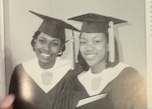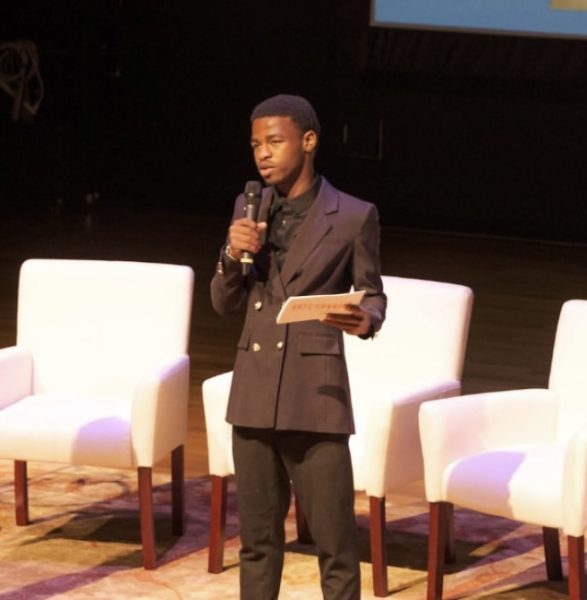Sophomore Elizabeth Hawes marches for reproductive rights
CVHS sophomore Elizabeth Hawes describes her experience with feminism and the Houston’s Women’s March.
Photo courtesy of Danielle Yampuler
Sophomore Elizabeth Hawes, member of CVHS Riot Club and participant in the Women’s March stands proudly in the halls of CVHS.
On October 2, over 10,000 people flooded the streets of downtown Houston. Many donned pink clothing, clenched fists, and exclamatory signs. They were there to join in on the fifth annual Women’s March, its numbers mirroring the original march from 2017. Back then, people had flooded the streets on ex-president Donald Trump’s first full day serving his term, protesting what they perceived as misogynistic actions and harmful rhetoric. In the most recent protest, people, especially in Texas, marched for another reason- they were marching for the right to control their own bodies. CVHS sophomore and Riot Club (a CVHS club that revolves around teaching its members the history of feminism and the complexities of modern feminism) member Elizabeth Hawes was among one of the many angry women in the crowd.
“Even though it was a protest and there were police around- I felt safe, you know, I was one in over 1000 people, and we were all there for the same reason, and that kind of unity is beautiful,” says Hawes.
Hawes is referring to the unity shown against Texas’s newest abortion law. On September 1, SB 8, also known as the heartbeat bill, went into effect, instituting a near-total ban on abortion. The law is one of the most restrictive abortion bans in modern American history. The bill stipulates that all people with uteruses could not have an abortion after six weeks- when an unborn fetus develops a heartbeat.
This sparked both rage and fear in many people assigned female at birth. Hawes mentioned that most women don’t even realize they’re pregnant after six weeks, and after that, deciding whether or not to get an abortion is a hard decision, and the bill only shortens the time a pregnant person may have to think.
She marched with thousands of other women scared for the stability of their rights, just one voice in a loud chorus of chants- chants like “my body, my choice” and “*%$# Greg Abbott.”
“It’s a march for our rights and freedom to be seen as people, and not just as vessels- as women, that are just as equal and just as worthy of being taken seriously as men,” says Hawes.
This point became a staple of Hawe’s ideology. The idea is that a woman is not what she can do but rather what she truly is. She spoke about how she felt that society had simplified women to what they could do for men throughout history. Caregivers, mothers, sisters, home keepers. They are never just themselves. And when they step out of line, history makes sure to reprimand them.
“The Madonna-Whore Complex is simply a perception of women that divides them all into your pure, virtuous Madonnas who know their place and everyone else, which is contemptible,” Hawes says.
The law has garnered opposition from both sides of the political spectrum, even people who do not support abortion. Many people have criticized how the law makes no exception for cases of rape or incest- an assertion that Hawes sees as hypocritical and problematic.
“If every fetus is a little life, a little child that needs to be protected, then why make exceptions in cases of rape or incest? What removing cases of rape and incest leaves is women who had consensual sex- so lack of access to abortion is essentially a punishment for women who dared to have sex because they wanted to,” Hawes says.
She goes on to explain that she believes this punishment is “dehumanizing.” It encourages people to commit acts of sexual violence with the incentive that they will not be punished to the extent of their victims. Hawes further discusses the dehumanization of women who choose to have consensual sex by considering the insults society most often gears at them.
“One of the funniest things to me is that we have ‘slut’ and ‘whore’ as insults for women. There is no corresponding insult because promiscuity for men is not a bad thing,” said Hawes.
Hawes believes that this is reflected in another law enacted by the heartbeat bill- one that states that women who seek an abortion, or those who aid women seeking abortions, can be sued and face lawsuits.
“This is rife for abuse. The end result of it is that you’ve essentially got a bunch of vigilantes going around suing the Uber driver who helped a woman get there. A friend who gave her money. A priest or another friend or a parent who emotionally counseled them. And part of the legal part of the early backlash was from priests who thought and said, ‘am I supposed to now fear giving counsel to my parishioners?'” Hawes says.
In Hawe’s opinion, all these reasons and more is why people marched for the rights of those who can carry children. As a member of CVHS’s Riot Club, Hawes makes sure to stay in the know and form her own opinions on feminist issues. To her, this is an infringement of people assigned female at birth’s bodily autonomy, stripping of choice. Hawes stated how she felt that, under this law, pregnant people acquire fewer rights than corpses.
“Organs are taken out of corpses, but you have to get permission from the person before they die. When I had “donor” put on my learner’s permit, they had to ask me about that beforehand. We grant that respect to dead bodies, and yet, that law would mean that we don’t grant that respect to pregnant people, to anyone who can become pregnant. They’re forcing us to accept less respect and control over our own bodies than we give to corpses,” says Hawes.
While federal judge Robert Pitman recently blocked Texas’s abortion law, the fight is not over. The law must still lose its court case to stay out of effect permanently. Even after that, many states nationally have attempted to pass similar bills and laws to Texas’s. Because of this, women marched all over the USA. Hawes spoke about what she felt she had gained from marching along with them.
“I learned what it is to be out there. I’m 15. Legally, I am a child. I can’t drive. I can’t have a credit card. There’s so much separation between young and old. And I know that as a child, I am not going to be taken seriously. But just being there with so many other people, it was incredible,” Hawes says.
Your donation will support the student journalists of Carnegie Vanguard High School. Your contribution will allow us to cover our annual website hosting costs and fund field trips, competition fees, and equipment. We appreciate your support!

Danielle is a senior, as well as an activist for queer and feminist rights, which often makes its way into her writing. She is a family and friendship-oriented...








Judith Carrizales • Oct 22, 2021 at 1:58 pm
Your lead was perfect, amazing. I loved it. It makes us feel like we are in the crowd. I like how you included quotes that question the law. It really shows what Elizabeth thinks regarding the law. This story was amazing. I dunno what else to say. Good Job. One of the best stories published on Upstream News by far.